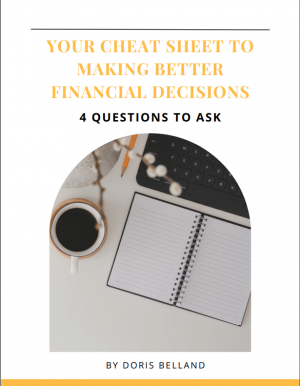Quick test, True or False:
1. When you die, it will make no difference for your partner whether you were married or in a common-law relationship when it comes to the transfer of assets.
2. Any jointly held assets automatically pass to the survivor with or without a marriage.
3. If you are not married and you are not on Title but you have been living with your partner in “your” house for more than three years, you automatically get possession after his/her death.
4. If the distribution of assets is clearly spelled out in a valid will, there will be no problems with the estate.
I’ve discovered two interesting things about death.
First, it appears to bring out the very best in people or the worst.
Second, we are not all equal in death.
We’ll look at the answers to the questions above in a second, but first let’s consider the issue of behaviour.
Here’s what I’ve seen and experienced personally:
✨ People you hardly know fill your freezer.
✨ Neighbours cut your lawn.
✨ Your closest girlfriends take over with the kids while you try to sort out what just happened.
✨ Your brother-in-law sells the car you no longer need.
✨ A banker cuts you some slack on an upcoming mortgage renewal.
✨ Strangers donate money to help with expenses.
Then there’s the other side:
🔻The fight over assets.
🔻 The fight over heirlooms, family photos; who gets what and who is excluded.
Even when there is a will, people manage to find a way to argue about what they feel should have been done for them or left to their progeny.
Loved ones discover unexpected inclusions or exclusions in the will and suddenly feelings are hurt, noses are bent out of shape and the war is on.
Family members who have been getting along reasonably well for decades suddenly stop speaking to each other.
Much of the above could be prevented with a clearly defined will and good communication with the people it will affect.
Shocking statistics
We all know that wills are important.
Many of us know of cases where families have been torn apart because of problems with estates.
And yet, a surprising number of us do not have wills, even after we get married and have children.
According to a survey released by Lawyers’ Professional Indemnity Co. (LawPRO), the majority of Canadian adults – 56% – don’t have a signed will.
Fifteen years ago I was one of those adults.
I didn’t have children so I figured it wasn’t a big deal.
That was before my first husband died without a will and without insurance.
One other thing: We had a business that owed a lot of money, mostly to the bank and to suppliers.
When my first husband died, I was in deep trouble on so many fronts.
The last thing I wanted to deal with was the legal issue of sorting out his estate.
Sadly, that’s exactly what I faced.
A will wouldn’t have erased the fact that I had no money to fall back on after he died, nor would it have paid off the massive bills.
But it would have made life a lot easier at a difficult time.
When you’re dealing with the trauma of loss, anything that makes your life easier is a blessing.
My first “aha!” as a widow
The first big lesson that I learned as a widow was the importance of having a will.
As one lawyer put it, if you have assets of any kind, you need a will to sort out how they are to be distributed in the event of your death.
If there is no will, the law will dictate who gets what and that will depend on the jurisdiction in which you live.
Now just for fun let’s throw in the question of marriage.
Common-law spouses are eligible for benefits and are treated as equals when it comes to things like pensions, therefore they’re also treated equally after death, right?
No.
Obviously I can’t comment on how it works for all of my readers since this blog is read by people in many different countries.
The following applies to people who live in my jurisdiction – Ontario, Canada. I would encourage you to look into the details for your own area.
The biggest misconception is that common-law spouses have the same rights as married spouses.
In Ontario, that simply isn’t true.
When someone dies intestate (i.e. without a will) the married spouse gets the first $225,000 of the estate.
The rest of it is divided equally between the wife and the children.
However, there is no automatic transference on death to the common-law spouse.
First the estate goes to the biological children, then the parents of the deceased, and if the latter are deceased, it passes to the siblings.
A common-law spouse would have to bring an application to the court to receive any part of the estate when there is no will and she does not jointly own the assets.
At a minimum, she will face headaches and significant costs. There is also no guarantee that she will be successful.
The best plan
The best way for any woman to protect herself and to make life easier in the event of her partner’s death (married or common-law) is to be on Title for the house as a Joint Tenant, to jointly own all assets (including bank accounts), and to be the named beneficiary for investments, pensions and insurance policies.
First, when assets are held jointly they automatically pass to the survivor.
You only need to provide a Death Certificate and some personal information.
Second, by avoiding the need for Probate you also avoid estate taxes.
Where assets are held solely in the deceased’s name, a will is invaluable.
For example, bank accounts, cars, investment accounts and so on can easily pass to the survivor with a will.
Without a will, most assets get added to the estate and must go through Probate, a legal process to determine the distribution of assets.
Unfortunately, the province takes its share by charging a tax on the value of the assets going through Probate.
The higher the value, the more tax you pay.
The whole process can be summarized as follows:
- If you’re married, you have more rights under Ontario law.
- When you own things jointly, you get them automatically as the survivor and you avoid estate tax.
- When you’re the beneficiary on an investment, you get it automatically and avoid estate tax.
- The smartest thing you can do for yourself when it comes to avoiding hassles and paying a ton of estate taxes is to ensure your spouse has a will and you jointly own everything together.
What if you die?
What happens if you die?
What about your kids and the other people you love?
Who will take care of your children?
Where will the money come from?
Who will get the heirloom necklace you inherited from your Grandmother?
What about the family photos, the special dishes you used for the big occasions in your family’s life together, your wedding ring and the myriad of sentimental and important items filling your house? Who will get those?
The only way you can ensure that your wishes are met is if they are spelled out explicitly in a will.
Let’s assume that I’ve convinced you that a will is essential. Where do you go to get one? Do you really need a lawyer to create a will?
It used to be that a lawyer was your only option to prepare an effective will.
However, there are currently excellent online options for a fraction of the price.
I’ve personally used LegalWill.ca and recommend them. They guide you through a large number of possible scenarios to ensure you cover the most important bases.
And the best part is that you’ll end up with a will for less than $100.
I did a side-by-side comparison of the will that a lawyer prepared for me, and the will that I produced through LegalWills. The two wills were virtually identical.
If you decide to try the online route, you can use this Discount Code – THRIVE20 – to get a 20% discount from LegalWills.ca.
If, however, you have a complex situation, I encourage you to speak to a lawyer. Interview a few, get quotes and find one that you’re comfortable with.
Either way, it’s a small price to pay for such a critical document.
And the quiz?
How did you do on the quiz?
Questions 1 and 3 are false, and questions 2 and 4 are true.
That said, for question 4 you might argue that something can always go wrong with a will if someone decides to contest it.
Perhaps, but if there is a clear, valid will specifying who gets what, then you’ve set yourself up with the best chance for success.
If you’ve had any experience with wills, good or bad, please share below. I’d love to hear from you.
Want a proven process to help you make savvy financial decisions that are in your highest, best interests every time?
Grab your copy of my FREE Cheat Sheet.
In it, you’ll discover the four key questions to ask yourself, in order, to gain total clarity on the right financial decisions for you.
This process works for all decisions, big and small.
Make indecision, second-guessing, and analysis-paralysis a thing of the past.



2 Responses